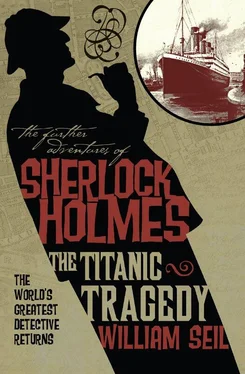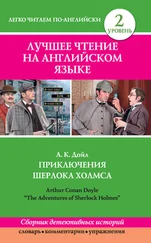My dear Watson,
I realize that this request comes at a particularly sad time for you, but once again, I am in need of your help. In the morning I will board a ship for America, and will not be seeing you again for some time. The government has asked me to conduct a secret investigation and, after some encouragement from persistent senior officials, I have accepted. I would appreciate it if you could find your way clear to join me on this voyage. My investigation does not begin until I reach America, so the voyage will be relaxing and uneventful. The trip would do you good and I would greatly enjoy seeing you at the start of this adventure. However, after we reach New York, I fear that my mission will lead to our separation, so come at once if convenient—if inconvenient, come all the same. Mr Reilly will provide you with a ticket.
Very sincerely yours,
Sherlock Holmes.
‘I am convinced, Mr Reilly. I will have my cases packed and be ready to travel in the morning.’
‘Very good, Doctor. That concludes our business. You understand, of course, that everything you see and hear — including our meeting tonight — must be treated in the strictest of confidence. Your friend, Mr Holmes, is undertaking a mission that could prove to be a turning point in the nation’s security.’
‘During my long association with Holmes and his clients, I have never betrayed a confidence. You can rely on me, completely. Now, can you tell me with what I am getting involved?’
‘I regret that I am unable to oblige. Mr Holmes will tell you as much as he can, once you get on board the ship. But I can tell you that your friend is a hard man to bring out of retirement. I’m sure you’re familiar with Winston Churchill, the First Lord of the Admiralty. Well, he and I first visited Holmes’s retreat about a week ago to ask for his help. He listened to us, but wasted no time in turning us down. It was only after we made a return visit with the Prime Minister and Foreign Minister that he agreed to carry out the investigation.’
I chuckled. Retirement had done little to change Holmes. He remained as independent as ever. Even as Holmes approached his sixties, he could not resist a challenge to his remarkable talents.
Reilly began strolling around the room, first examining the mantelpiece, then the bookshelves. After perusing everything with a quick sweep of his eyes, he turned to me with a look of disappointment.
‘Forgive me, Doctor,’ he said. ‘I’ve read every article you’ve written about your adventures with Mr Holmes. I was expecting to see a few keepsakes from 221B Baker Street... Maybe some of Holmes’s scrapbooks, or a Persian slipper full of tobacco hanging from the fireplace. But there’s nothing here, and I saw very few mementoes at Mr Holmes’s country estate. If you will forgive my curiosity, what happened to it all?’
I took Reilly by surprise with a hearty laugh. ‘Do you believe in time travel, Mr Reilly?’ I motioned to a closed door next to the sideboard. ‘If you’ll step through that doorway with me, I will take you on a journey into the past that would make H G Wells envious.’
I struck a match on the mantelpiece and opened the door. Light from the electric lamp over my dining table stretched across the fading twenty-year-old carpet in the adjoining room. ‘This is the one room in the house where I don’t allow electric lights.’ The first match had burned to my fingertips, so I struck a second one and lit two oil lamps that were fixed to the walls.
‘Mr Reilly, welcome to 221B Baker Street. If you look around, I’m sure that you’ll find more than enough mementoes to satisfy your curiosity.’
Until now Reilly had been emotionless to a fault. But suddenly, upon seeing this room, his eyes lit up and he began a whirlwind examination of its furnishings. ‘This is wonderful, Doctor. I can’t believe it. It’s just as you described your Baker Street rooms in the articles.’
‘Well, I confess that I never expected to become a museum curator; nor that my past life would end up as an historical display. But when Holmes moved out of 221B, I just couldn’t accept seeing all those memories of happier times being scattered about. So Holmes generously gave everything to me, and bought new furnishings for his country home. Of course, there were a few pieces that he could not part with. For example, if you’ll look over at that side table next to the settee, you’ll see a violin. I had to purchase that at a second-hand shop. Holmes took his with him. But most of the furnishings are original.’
‘Back there, in the corner, is that where Holmes conducted his experiments?’
‘Yes, smelly old things they were, too. I used to welcome the aroma of Holmes’s tobacco smoke, because it would cover up the smell of sulphur. Here, let me give you a tour.’
Reilly sat in Holmes’s velvet armchair and, after asking permission, tried on the deerstalker cap that was hanging on the wall rack. He chuckled at the stack of letters that were fixed to the mantel with a jack-knife.
‘Tell me, Doctor. The letters VR that are perforated in the wall. Did you reproduce them with a revolver, as Holmes did, or did you use a quieter, more conventional approach?’
‘I used a hammer and a spike. I am not as precise a marks-man as Holmes, and the London police these days are less tolerant of the sound of gunshots than they used to be.’
‘Mr Holmes was a remarkable man.’
‘He still is. Just a little less active.’
Reilly froze for a moment, his eyes fixed on the floor. When he looked at me again, the cold, commanding gaze had returned to his eyes.
‘Doctor, I am concerned about the safety of your friend, and the success of his mission. It is important that when you see Mr Holmes on the ship, you bring certain facts to his attention.’
‘And what might those facts be, Mr Reilly?’
‘Simply, Doctor, that times have changed. And so has the world in which Mr Holmes will be carrying out his mission. Mr Holmes has confronted opponents who were both cunning and dangerous. Still, most of them had certain standards by which they played the game. I don’t quite know how to define it. You might call it a Victorian ethic...something in their upbringing that tempered their lawlessness. Doctor, believe me when I tell you, that that is not the case in modern espionage. Mr Holmes will be dealing with individuals who care nothing about human life. He will be in grave danger. And unless he is willing to become as cold and ruthless as his opponents, I suspect he will not survive.’
I did not know how to react to this extraordinary statement. At first, I was offended that this upstart should be so disrespectful of Holmes’s experience and abilities. Still, there was something in his manner that told me that he knew his business, and he did not give idle warnings.
‘Mr Reilly, I assure you that Mr Holmes is quite capable of taking care of himself. He may not be as young as he used to be, but his mind is as sharp as ever. And as for cunning opponents, if you’ve read my articles, you must be aware of his confrontation with the late Professor Moriarty. As you may recall, Holmes had laid a trap from which the professor knew he and his cohorts could not escape. When Holmes refused to back away, Moriarty on several occasions sent henchmen to kill him. Holmes and Moriarty had their final confrontation at Reichenbach Falls, where they struggled and Moriarty fell to his death. I could scarcely imagine a villain as dangerous as the professor.’
‘As I recall, Doctor, at Reichenbach Falls — before the struggle — didn’t Professor Moriarty allow Mr Holmes a few moments to write a note to you, explaining what was about to take place? I seem to recall from your work that you found such a note under Holmes’s cigarette case when you returned to the Falls.’
Читать дальше












